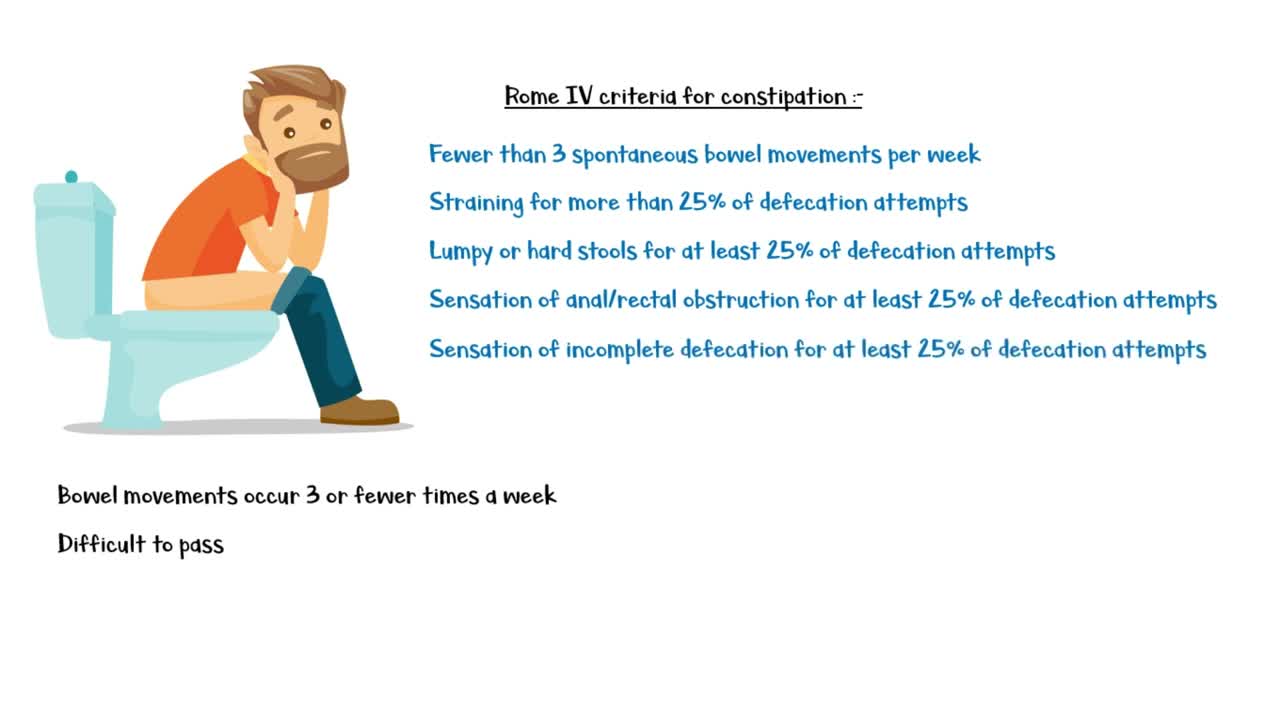Premium Only Content

Constipation _- Definition, Causes & Treatment _Patient Education _Med Today
Constipation is actually a symptom, rather than a disease. Generally defined as when bowel movements occur 3 or fewer times a week, that are difficult to pass.
According to the Rome 4 criteria for constipation, a patient must have experienced at least two of the following symptoms over the preceding 6 months.
Fewer than 3 spontaneous bowel movements per week.
Straining for more than 25% of defecation attempts.
Lumpy, or hard stools for at least 25% of defecation attempts.
Sensation of anal or rectal obstruction or blockage for at least 25% of defecation attempts.
Sensation of incomplete defecation for at least 25% of defecation attempts. Manual maneuvering required to defecate for at least 25% of defecation attempts.
There are many causes for constipation. General ones include Low fiber diet; And immobility. Metabolic, and endocrine causes are, Diabetes; Hypothyroidism; And porphyria. Certain drugs can also cause constipation. Including opiates; Calcium channel blockers; Antidepressants; Iron; And anti muscarinic agents. Neurological causes of constipation include spinal cord lesions; And Parkinson’s disease.
Psychological causes of constipation are, depression; Anorexia nervosa; And repressed urge to defecate. Any gastro intestinal disease can cause constipation. Common ones include, Intestinal obstruction; Colon cancer; Anal fissures; And Diverticular disease.
In order to treat constipation, first, any underlying disease should be treated. In addition, increasing the fiber content of the diet; And increasing fluid intake will help soften the stools and propel them more easily through the digestive tract. In some cases, laxatives may also be needed.
#Constipation #ConstipationRelief #MedToday
-
 UPCOMING
UPCOMING
Matt Kohrs
4 hours agoStock Market Open: Bulls Push For New Highs || Live Trading Futures
7951 -
 UPCOMING
UPCOMING
Wendy Bell Radio
4 hours agoSay Their Names
2.69K41 -
 LIVE
LIVE
LFA TV
2 hours agoLFA TV ALL DAY STREAM - TUESDAY 9/9/25
15,326 watching -
 1:13:16
1:13:16
JULIE GREEN MINISTRIES
2 hours agoLIVE WITH JULIE
38.6K99 -
 LIVE
LIVE
JuicyJohns
38 minutes ago🟢#1 REBIRTH PLAYER 10.2+ KD🟢
162 watching -
 19:37
19:37
BlaireWhite
1 day agoWe Need To Talk About The Trans Shooter, "Robin" Westman.
5145 -
 12:22
12:22
Chad Prather
14 hours agoFinding God’s Timing in a World of Pressure
3.85K2 -
 LIVE
LIVE
The Pete Santilli Show
2 hours agoMORNING STREAM Tuesday September 9, 2025 💣 THE PETE SANTILLI SHOW & SANTILLI REPORT (Monday 9/8)
485 watching -
 LIVE
LIVE
The Chris Salcedo Show
11 hours agoWhat Does The Data & Science Say?
490 watching -
 20:14
20:14
Jasmin Laine
17 hours agoSHOCKING SLIP-UP: Liberals Accidentally CONFIRM Oil & Gas PHASE-OUT
35.1K24